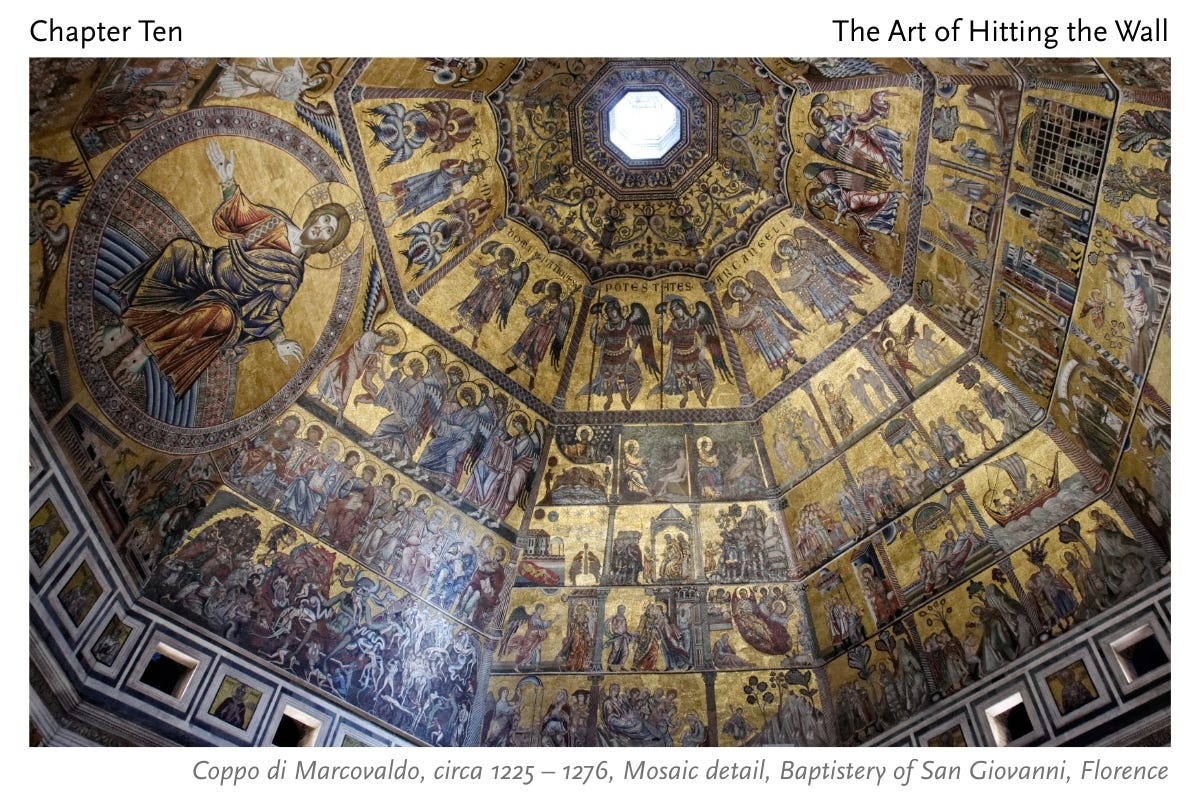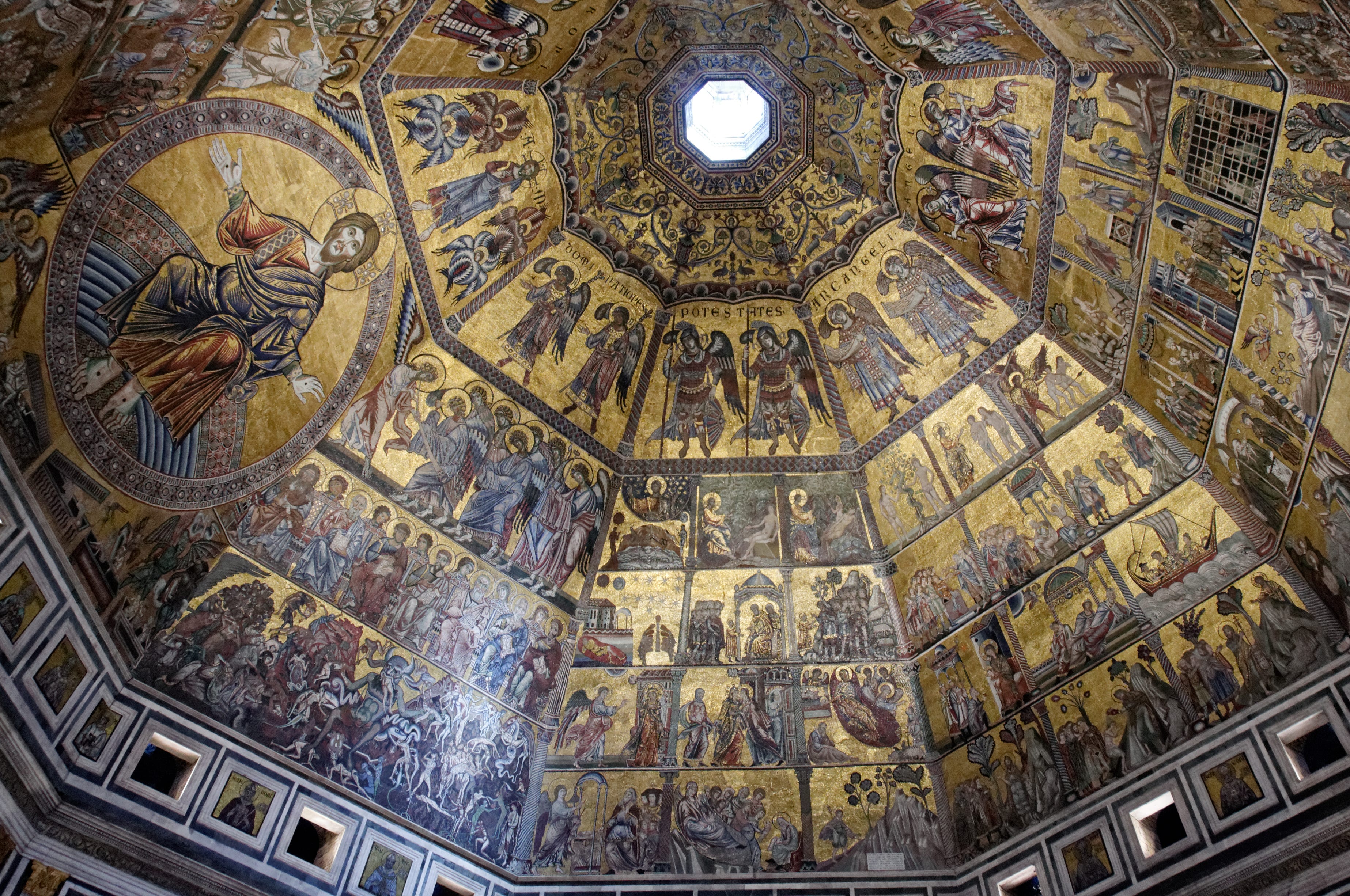Chapter 10: An Outstretched Hand [Part 1]
Filippo stands draped in his plain white undershirt, linen falling softly across his shoulders. The terracotta tiles are cool beneath his feet, and clammy with morning damp. From the square, a bell tolls the hour. Each toll sinking into tile and stone, a deep vibration rising through the soles of his feet. The echo drifting through the open window where the curtains stir, carrying with it the scent of wet stone.
On the chair beside him lie the clothes he had chosen the night before: a tunic of deep mauve wool and a plain leather belt. Dignified, or so he had thought. But then had come the knock. His father had stepped inside, and with one glance at the laid-out garments, his mouth had tightened into a thin, silent line. He had made no gesture, said not a word, he only turned and walked out again, the weight of his disapproval trailing behind him.
Minutes pass, and then, with no great surprise, Matteo appears at his door, arms heaped high with velvets and silks. He spreads them out across the bed with exaggerated ceremony. First, a pale silk shirt with its ivory lace so fine the collar and cuffs seem to froth on the air. Filippo lifts a silken sleeve, the fragile lacework spilling between his rough, stained fingers — mocking in its delicacy. He groans.
Matteo sets each piece out: an undercoat traced with gold, delicate patterns threading through the fabric, and a deep green velvet overcoat, its panels stiff and structured, parted at the elbows to let the gold patterning of the undercoat’s sleeves show through.
His expression is grave in imitation of their father, but Filippo catches it — the faint twist at the corner of his mouth — the smallest glint of pleasure at playing this role for his older brother.
Piece by piece, the fineries begin to close in around him. Silks, wools and velvets and a pair of dark hose. Pulling them on, he wiggles his toes to test their strength.
Their father returns in a long gown of severe blue velvet, a hint of crimson silk in the lining of his sleeve as his impatient hands reach to cinch a thick girdle at Filippo’s waist.
Filippo is sure his room has never felt so small, the narrow walls pressing in as the parade of finery continues. Watching with weary eye as a gold signet ring is pressed into his palm, a gem-studded gold brooch in the shape of a hummingbird pinned to his cloak, its gemmed eye glinting.
“Pippo — your feast-day shoes! How are they so scuffed?” Matteo asks, producing a pair of slightly pointed leather shoes. “I will oil them and buff them,” he promises, “and I will see them shining like new,” his voice trailing down the corridor in search of an oilcloth.
And now, Livia enters. Her gown of silken brocade bears a bold pattern of pomegranates in shades of cream and rose. Her eyes shine, but her smile stops short, restrained. Her skin glows pale and unnaturally luminous, the effect of a thin wash of egg-white that has dried, tightening to pull it taut. Her cheeks are dusted with the faint dusky rouge of madder root.
A cloud of scents drifts with her. Rosewater he recognises, but the rest he cannot place, strange and foreign to him, clinging to her, borrowed airs. Beneath them, the sharp tang of vinegar cuts through. Filippo has a sudden thought of kitchen jars when she was pickling onions, and those pale bulbs shrunken and suspended in their sour brine.
She carries, two-handed, a small round mirror, in a frame of ornate design, turning it, gleaming, toward her son.
Filippo meets his reflection suspiciously.
The man looking back at him shines like a stack of gold florins. But already the lace clings at his throat, the girdle biting at his ribs. He tugs at the collar, shifting restlessly in his new skin.
Brunellesco pauses at the threshold, scanning the open street, then gestures for his sons to lead the way.
Tilting his head towards Livia, he turns out his arm and offers her the crook of his elbow. Livia rests her hand there, her fingers light, with the other, she tightens the fastening of her bonnet. They move in step, the fabric whispering across the stones as they step out into the street.
Outside, the air is growing thick with humidity, the sun smothered by a low blanket of cloud that sags heavy, pressing down on the city.
Filippo makes his way beneath his burden of cloth, eyes low to the ground. The rounded cap traps the heat against his skin. Already beads of sweat are rising at his temples, threading damp through his dark hair, pooling where the lace bothers his throat. The furnace on pouring day is nothing compared to this, he thinks. This heat has no escape.
Ahead of them, pigeons scatter as figures emerge from side streets in their twos and threes, all pulled toward the same direction.
Livia sees the crowd thickening: merchants in their stiff collars walk alongside apprentices from the workshops, mothers leading their children, all in Sunday dress. She hears the thin wail of an infant, and turns, searching the crowd, but the sound blends into the gathering murmur. With her free hand, she smooths the fabric of her gown, but when she looks again at her husband, she feels how her composure has slipped — a thread of unease pulled to the surface before becoming aware of it. She holds on to Brunellesco’s arm more tightly than before.
The current carries them forward, drawn as if on strings, toward the waiting octagonal hall — the Baptistery with its doors open wide, yawning to let them in.
At the Baptistery of San Giovanni’s south door, a pair of lanterns burn stubbornly against the grey. An attendant straightens, scanning the tide of townsfolk as they enter. Out of the corner of his eye, he catches a brilliant shimmer of brocade as Livia passes by him, the textured ivory pattern of her gown briefly catching in the lanternlight, as she crosses the threshold.
Filippo shuffles in, blinking, his eyes straining against the dimness. The marble tiles spread out beneath his steps in fine geometries, a chessboard of black and white.
He lifts his gaze. Eight walls of marble rise up around him, paler as they climb. A row of narrow windows punctuates the stone all around, and above them, a row of smaller windows still.
Still higher, and the walls draw inward, tapering into a great octagonal vault. Its surface fractures into a million tiny squares, mosaic tiles of glittering gold, each one catching and multiplying what little light the windows will allow.
At the crown, where eight walls converge, the great octagon tapers into a single small window cut directly above, where a sliver of outside’s grey peers in. Its weak light, pouring down the great stone funnel, spilling down the marble walls, glancing off the patterned floor, and rebounds upward again.
And once the eye has adjusted, the chamber is not so dark at all. Gradually, the space begins to glow, bathed in amber radiance that seems to come from everywhere all at once — a heaven of mosaics come alive, swarming with faintly glittering angels wheeling among the solemn saints — and the damned.
Image:
Mosaic detail, Baptistery of San Giovanni, Florence. Created by Coppo di Marcovaldo, circa 1225–1276, with each tiny square of glass and gold leaf, around ten million of them, laid by hand.
Image Credit:
Photograph by Marie-Lan Nguyen for Wikimedia Commons © Marie-Lan Nguyen / Wikimedia Commons / CC-BY 2.5






Your description takes me there, loving it.